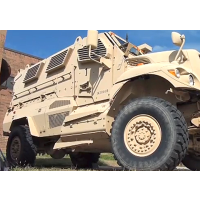June 30, 2014

Federal funding, along with giveaways of surplus equipment from the Iraq and Afghanistan wars, have caused local police departments to become more militarized. Nowhere is this clearer than in the overuse of Special Weapons and Tactics (SWAT) teams by law enforcement in day-to-day policing. Now, some agencies are trying to make SWAT operations more opaque by registering them as private corporations.
In Massachusetts, many SWAT teams are run by law enforcement councils (LEC). These groups get their funding from police agencies in their region and are run by a board of directors that’s usually composed of chiefs from participating departments. But although they’re funded by tax dollars, and their personnel are members of public law-enforcement agencies, some of these LECs hide behind corporate identities when public records requests are made.
Those LECs have incorporated under the 501(c)(3) section of the tax code and claim that they’re exempt from public records requests, according to Radley Balko of The Washington Post. The status of these SWAT teams, which number about 240 of the state’s 351 such groups, came to light when the American Civil Liberties Union (ACLU) attempted to obtain public records for a report about the militarization of American police agencies. The LECs simply refused to deal with the requests, saying they weren’t obligated to provide records.
The ACLU has responded by filing suit against one LEC, the North Eastern Massachusetts Law Enforcement Council (NEMLEC). “NEMLEC can’t have it both ways,” ACLU of Massachusetts staff attorney Jessie Rossman said in a statement. “Either it is a public entity subject to public records laws, or what it is doing is illegal.”
But keeping records out of the public eye is a good way for LECs to deal with incidents such as one in which Eurie Stamp, a 68-year-old grandfather of 12, was shot and killed by a SWAT team that came to a Framingham, Massachusetts, house to arrest his girlfriend’s son. The suspect was arrested outside the house, but police stormed in anyway, and Stamp died after an officer’s gun went off.
The ACLU study showed that SWAT teams are twice as likely to enter a home during a drug sweep as they are for other deployments. In addition, half of all SWAT deployments come against black or Latino subjects. Only 20% come against white subjects; the race of the remainder of the subjects is unknown.
Another salient point from the ACLU report was the increasing use of military-style equipment by SWAT teams. Many teams, even those connected with small cities, are obtaining from federal surplus or purchasing items such as assault rifles, battle dress uniforms and even armored personnel carriers, such as the one used by Ohio State University to monitor football game day activities.
-Steve Straehley
To Learn More:
Massachusetts SWAT Teams Claim They’re Private Corporations, Immune From Open Records Laws (by Radley Balko, Washington Post)

No comments:
Post a Comment